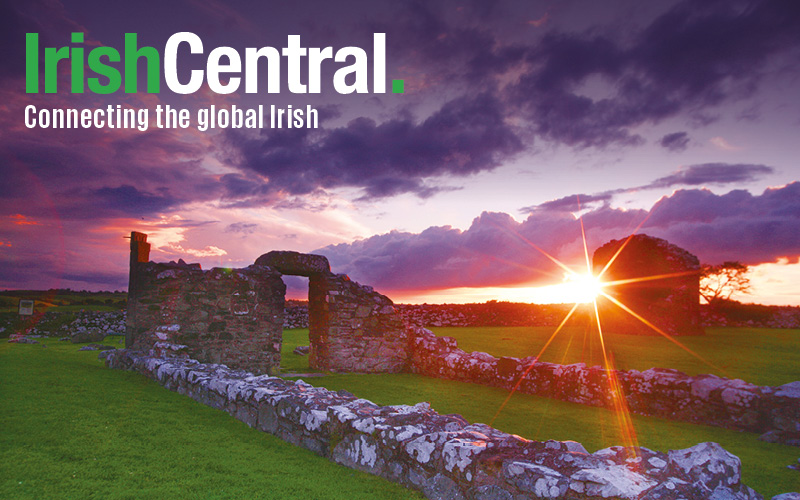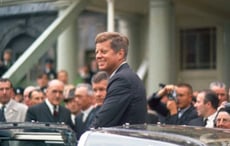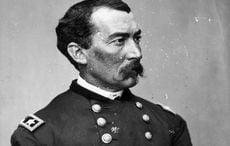As the British fled New York, on Evacuation Day, Washington breakfasted with America's greatest spy, Hercules Mulligan, an Irishman who had saved his life at least twice.
On the morning after Evacuation Day, November 25th, 1783, George Washington, newly resident in New York, kept a breakfast engagement.
He was the hero of the hour, feted the night before at Fraunces Tavern by Governor Clinton of New York and many other leading figures. He was the magnificent leader of a brand new nation that, even then, looked likely to be the most powerful on earth.
He had just held a farewell morning parade in Bowling Green. The British ships had sailed for home after seven years of occupying New York; their grasp on world domination shattered for all time. Their ignominious defeat at the Battle of Yorktown in 1781 dealt a fatal blow to their empire-building and willingness to fight.
Even the mad King George III knew the jig was up - the cost of supplying an army in America a crushing burden at a time when the British economy was in dire straits. It was time to wind down. America would be free.
Read more
From Yorktown on, the outcome of the fight was inevitable and the capture of New York by the rebels on that famed clear and crisp November day two years later was merely the coda to a magnificent American campaign. The British drummers and fife had allegedly played a tune called “The World Turned Upside Down” after the Yorktown defeat.
Indeed it was. The signing of the Treaty of Paris ended hostilities between the United States and Great Britain on September 3, 1783. But such was the panicked mass seeking, on Tuesday, November 25th, 1783 - forever since known as Evacuation Day - with the British ships beyond the horizon, Washington would lead his men in a victory parade on Broadway. Washington would celebrate at Cape’s Tavern with Governor George Clinton and nine days later would make his famous farewell speech to his troops at nearby Fraunces Tavern - still standing today - a speech which has been read out every year since by a member of the US congress.
If things had turned out differently he had made clear where his last stand would have been.
“If defeated everywhere else, I will make my stand for liberty, among the Scots-Irish in my native Virginia.”
But there was no need for that. Thanks in part to the Scots Irish and Irish Catholics, Washington had carried the day.
Indeed, just a few months later, on April 2, 1784, Lord Mountjoy, would go on to lament in the British Parliament that “America was lost by Irish emigrants … I am assured from the best authority, the major part of the American Army was composed of Irish and that the Irish language was as commonly spoken in the American ranks as English. I am also informed it was their valor that determined the contest.”
It is not known where Mountjoy was taking his facts from, but modern scholarship has certainly shown the Irish role to have been far greater than was supposed.
On November 26th, the day after Evacuation Day, Washington would certainly make immediately clear how important the Irish had been to him, especially one man.
America's greatest spy
On his first triumphant day in charge, when he could have met with any number of his greatest generals, dignitaries or politicians, or attended a hundred breakfasts in his honor, Washington mounted his horse Nelson, a handsome chestnut. From where he was staying at Number One Broadway, the former residence of Archibald Kennedy, one of the wealthiest men in Manhattan, he rode for a half a mile towards where 219 Pearl Street now stands.
There he was going to break his fast with an obscure Irishman from County Derry, once a plain immigrant, living not in a gilded palace or grand hotel but an unremarkable small townhouse.
In Washington’s time, the house address was known as 23 Queen Street.
It was Washington’s clear intent on this day after the greatest of days to show the world how much he valued the secret role of the man who lived there, one Hercules Mulligan then aged 43. Mulligan’s father Hugh, a deep reader of Greek philosophy and myth had conferred the strangest of first names on him - so strange that some believed it was a pseudonym.
Washington must have cut a fine figure: a superb horseman, a great general, the father of the new country. But who was this Hercules Mulligan, this haberdasher he wanted so urgently to meet? The fancy set was at a loss to explain it. Washington knew that as one of his most valuable spies, Mulligan had made a profound difference in the war.
Washington certainly felt a debt needed to be repaid. As noted in the Recollections and Private Memoirs of Washington: "he breakfasted with M-----, to the wonder of the Tories and the perfect horror of the Whigs.”
Mulligan had saved Washington’s life on at least two occasions, historians agree while putting his own life at risk again and again.
Frederick Hitz, former CIA Inspector General revealed in his book "Why Spy? Espionage In An Age of Uncertainty that Former CIA Director William Casey" remarked to him in the 1980s that if he had his way the statue of martyred spy Nathan Hale at the then CIA Headquarters in Langley, Virginia, would be replaced by one of Hercules Mulligan. According to Casey, the Irishman was possibly America’s best ever espionage agent.
Washington also knew that it was Mulligan who had sharpened the steel of a young migrant who had stayed in Mulligan’s home for an extended period when he landed in America.
His name was Alexander Hamilton, and Mulligan is widely credited with turning him from a royalist into a revolutionary. The two spent hours talking when Hamilton was Mulligan’s guest and there is no doubt the Irish rebel had a major impact. The two men became close in life and even in death as they are buried next to each other in a New York churchyard.
Agent and master tailor
Mulligan was what became known as a “stay-behind agent” when the British took New York. He originally sought to flee but was unable to escape and continued his job as a master tailor.
His wife was the niece of a British admiral; his brother worked for a company that supplied necessary goods to the Redcoats and Mulligan’s loyalist credentials and expert skills as a tailor made him a favorite with the British.
Partly because of his strong loyalist links, he did a roaring trade. Newspaper ads at the time featuring Mulligan’s store talk of a “Clothing Emporium” with “superfine clothes of the most fashionable colors, gold and silver spangled buttons, gold epaulets for gentlemen of the army.”
For years amidst the dandys, the young posers, and the redcoat generals, Mulligan went doggedly about his task. Years later, he told Benjamin Tallmadge, the chief of intelligence for Washington, his stealthy methods of spying.
Read more
“Generals have a way of talking sometimes when they are being fitted for an embroidered waistcoat … so I keep my ears open”
A few glasses of the finest port also helped, as did the jovial nature of Mulligan who completely put his soldiers, officers, and generals at ease.
Culper spy ring
Unknown to the many redcoats and dandys who sought the finest clothes and uniforms, Mulligan was part of the Culper spy ring: men and women who risked their lives to carry information from behind enemy lines.
The ring was put together at Washington's insistence. He knew he was outnumbered on the battlefield and his men lacked vital experience, but cracking enemy intelligence would go a long way to leveling the playing field.
Washington knew the importance of a good spy. “There is nothing more necessary than good intelligence to frustrate a designing enemy, and nothing that requires greater pains to obtain,” he wrote
The Culper men and women were clever. They used invisible ink, an incredible invention for the time. They used couriers who never knew each other but left vital messages in tree hollows. A female member of the ring, Anna Strong, displayed her washing on the clothesline in a certain way when she had information. They rowed across Long Island Sound to Connecticut, where Washington was camped, so they would not encounter checkpoints.
They put the name of a British commanding officer on their secret envelopes on the grounds that any soldiers accosting them would be more reluctant to open such letters.
Love Irish history? Share your favorite stories with other history buffs in the IrishCentral History Facebook group.
Their influence was enormous, their role dangerous, their spirits daring.
But of all of them, the man Washington was meeting this morning was an extraordinary secret agent - hiding in plain sight, taking huge risks, seemingly impossible to track. The British knew someone at a very high level was operating in New York but it would take the traitor Benedict Arnold to unmask him. Even then, the British were not sure.
Indeed, Mulligan had performed so perfectly that right after the war some citizens of the new Republic suspected him of being a loyalist and wanted him hanged as a traitor.
Breakfast with Washington
The Mulligan accusers were thus in deep shock and denial when Washington showed up at the home and emporium of Hercules with its emblazoned sign that read “H Mulligan Clothier.”
After Washington was welcomed and bought a uniform in the shop following their breakfast, Mulligan quickly replaced the sign with “H Mulligan Clothier to General Washington.” He would continue to supply Washington with uniforms and necessities when Washington was in the White House and beyond.
That November morning, there’s no doubt Mulligan knew Washington was coming, and being a spy he also likely knew his eating habits.
He and his slave, Cato, discussed the preparations. Twenty percent of the population of New York at the time were slaves.
Mulligan later despised slavery and was among the leaders of the manumission group in New York to end slavery forever according to Alexander Hamilton biographer and historian Ron Chernow.
Cato played a key role in conveying intelligence information through Redcoat lines where an ordinary slave would hardly be glanced at. Yet, because he was black, he has effectively been written out of history.
(In a nice touch in the Broadway production of Hamilton, Hercules Mulligan is played by a black man and Cato is given a full voice at last.)
They would have prepared Washington’s favorite breakfast meal which consisted of tea or coffee and cold corn beef, cold mutton, and, of all things, chocolate.
Anti-British
Much of the information on the life of Hercules Mulligan comes from a brief 1937 biography of him simply entitled Hercules Mulligan and written by one Michael J. O’Brien.
O’Brien is little known but was a formidable historian - a fact recognized in 1932 when the National University of Ireland endowed him with an honorary master's degree for his work on the Irish in the revolutionary war.
O’Brien wrote massively and extensively on the Irish role and was the official historian of the American Irish Historical Society and the Friendly Sons of Saint Patrick.
His obituary in The New York Times of November 13, 1960, characterized O’Brien as having “established the facts about the very large Irish population in the colonies at the time of the Revolution and the important part they played.”
According to O’Brien, Mulligan had revealed himself early in life as virulently anti-British. Born in Coleraine, County Derry, he and his family were forced out of Ireland when Hercules was six. They were Presbyterians and dissenters, groups of whom would go on to be key figures in the ill-fated 1798 uprising against the British in Ireland led by Theobald Wolfe Tone and which drew heavily on Northern dissenters.
Hercules Mulligan became an Anglican later in life, perhaps because his wife, who had high-up royal connections, was from that tradition and it helped him with his own career. Nonetheless, he also contributed heavily to the upkeep of a Scottish Presbyterian church.
Dissenters were mostly descended from Scottish Presbyterians who were given land in the plantation of Ulster in 1609 after William of Orange had defeated the Catholic King James the First.
But the dissenters were hated both by the established Anglican church and the Catholics whose land they had taken as a spoil of war.
Presbyterians suffered greatly from discrimination as a result and were also targets of the Penal Laws - a series of draconian laws created to end all opposition to the Anglican church in Ireland.
Coming to America
Many of the Presbyterians made their way to America where they were greeted with open arms, thus began the Scots Irish diaspora which would go on to provide seven US presidents, most notably Andrew Jackson, who was born very shortly after his family reached American shores.
As for Catholics, Michael O’Brien also minutely traced the Irish Catholics who left Ireland at the time and who played an outsized role in the American revolution.
According to the Directory of American History: “Approximately 50,000 to 100,000 Irish (over 75% Catholic) came to the American colonies in the 1600s. During the 18th century, more than 100,000 additional Irish Catholics arrived, many as indentured servants. In the 1740s, nine out of ten indentured servants were of Irish origin.
As for the Scots Irish, the Directory says: “An estimated 250,000 Scots Irish migrated to America during the colonial era. Most colonial settlers coming from the Irish province of Ulster came to be known in America as the ‘Scotch-Irish’. They were descendants of Scottish and English tenant farmers who had been settled in Ireland by the British government during the 17th-century Plantation of Ulster.”
Irish immigrants of this period participated in significant numbers in the American Revolution. Tough as teak, contrarian, self-reliant, and no lovers of the British King, the Scots Irish were soon in the thick of it, while the Catholic Irish needed little incentive to join the fight against the old enemy. Unlike new arrivals from Britain, there was no complexity to their choice. The curse of Oliver Cromwell’s murderous campaign against Catholics in Ireland was deep in folk memory. They would fight with whoever was fighting the British.
Debt to Erin's sons
Washington’s adopted son, Custis, made clear his father’s debt to the Irish of both backgrounds in a speech, quoted by both Presidents Reagan and Obama when they first visited Ireland.
George Washington’s son said: “When our friendless standards were first unfurled, who were the strangers who first mustered around our staff? And when it reeled in the light, who more brilliantly sustained it than Erin’s generous sons?”
One of those generous sons was Hercules Mulligan.
From an early age, rebellion coursed through Hercules Mulligan’s blood, perhaps encouraged by the Irish schoolmaster. In addition, the circumstances of being forced to leave Ireland ensured that the American patriot spirit soon infused him.
Thus, when the Americans began to demand their own country and Republic, and to actively work towards overthrowing the crown, Hercules Mulligan was in the New York vanguard.
As it happened, his chosen employment as a tailor would make him invaluable to the Revolution.
But perhaps most important of all was the relationship between Mulligan and a callow young man just off the boat from the British West Indies whom Mulligan generously housed after his arrival in New York, giving him a place of honor in his own household.
This young man was none other than Alexander Hamilton. The two men would go on to make history and are buried next to each other in Trinity Church Cemetery in New York...




Comments